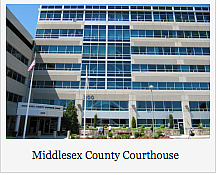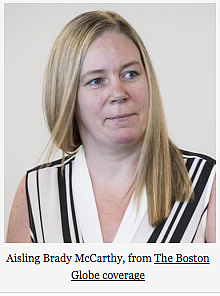Homicide charges dropped against Boston nanny

Middlesex County Courthouse
Last week’s decision to drop charges against Irish babysitter Aisling Brady McCarthy, finally free after two and a half years in jail accused of shaking 1-year-old Rehma Sabir to death, seems to have produced only a few ripples in the news, but I think the case will stand as a touch point in the ongoing debate.
The Middlesex County District Attorney dropped the charges against McCarthy after the medical examiner reviewed the evidence and amended the child’s autopsy report, changing the cause of death from “homicide” to “undetermined.” The move validated years of dogged filings by McCarthy’s defense attorneys, Melinda Thompson and David Meier, who had argued from the beginning that the shaking diagnosis was made without considering Rehma’s complex medical history, including a likely bleeding disorder.
A press release from the district attorney’s office quotes the medical examiner:
In particular the overall state of Rehma’s health and her past medical issues raise the possibility that she had some type of disorder that was not able to be completely diagnosed prior to her death.
Even the in-depth coverage of the story focused on the problems with this particular case, not the larger debate about the diagnosis, while most news reports stopped at McCarthy’s personal story and her joyful welcome in Ireland, and some treatments seemed intent on shoring up historical opinion. Boston’s public radio station WBUR, for example, broadcast an interview with Dr. Robert Sege, a member of the American Academy of Pediatrics committee on child abuse and neglect, who was asked about the implications of this story and a recent rash of successful appeals:
To me, it doesn’t raise the question at all. If you think about it, there are people who are falsely accused of murder, robberies, all kinds of things and the justice system is not perfect. So in a situation where we have hundreds and perhaps a thousand infants a year who experience shaken baby syndrome, the fact that 16 convictions over a multi-year period were overturned lets me know that the justice system worked, and that people get a fair shot at getting their story told.
WBUR also ran an interview with Dr. Shannon Carpenter, a bleeding disorder expert who seemed to think that McCarthy really is guilty. The reporter paraphrased Dr. Carpenter as saying:
[S]adly, no, there’s no kinder explanation here: Abusive head trauma — a better term than “shaken baby syndrome” because abuse can involve more than shaking — is far more common than serious bleeding disorders.
and offered this direct quote:
While anything is possible, you have to look at what’s probable and what other patients have experienced. And patients with bleeding disorders are not immune to trauma, whether it’s inflicted or non-inflicted.
Still, both Boston television station WCVBand letter writer Phillip L. Radoff in The Boston Globe noted that McCarthy’s case is the second Middlesex County shaken baby prosecution to be dismissed in the past year—charges were dropped in September of 2014 against local father Geoffrey Wilson. Both diagnoses were made by child abuse pediatrician Dr. Alice Newton, who presented at the National Center on Shaken Baby Syndrome conference in Denver last fall, on the topic, “Towards Better Collaboration Between District Attorneys and Child Abuse Pediatricians.” Her abstract for that talk includes this reflection:
With an increasing focus in our society on whether Abusive Head Trauma exists, close collaboration between medical professionals and law enforcement has become increasingly important for a successful investigation and prosecution.
What I find refreshing about Dr. Newton’s abstract is the full transparency: She seems to believe that the debate really is about whether or not Abusive Head Trauma exists, and she recommends that child abuse pediatricians view themselves as part of the prosecution team.
Meanwhile, Katherine Judson and Keith Findley at the Wisconsin Innocence Project wrote a letter to the editor of The Boston Globe praising the Middlesex medical examiner’s office for its willingness to re-think the McCarthy case and offering this bold—and accurate—indictment of the community of child abuse experts:
Even after nearly 20 reversals of convictions and hundreds of dismissals and acquittals, some proponents of the shaken baby syndrome and abusive head trauma hypothesis refuse either to acknowledge that there may be flaws in the diagnostic process or to engage in an honest conversation about the science. Instead, they engage in personal attacks upon those who challenge their dogma or claim that there is no debate.
What I think Judson and Findley are asking for is not more talk about whether or not abusive head trauma exists. Shaking a baby, like hitting or slamming a baby, is unacceptable and likely to cause serious injuries. The question is whether the findings that now lead to a diagnosis of shaken baby syndrome really do prove abuse.

Through years of pro bono perseverance, McCarthy’s attorneys finally convinced the county to drop the charges against their client, who must now figure out how to put her life back together. And unlikely as it is to say about someone who’s spent two and a half years incarcerated for a crime that never occurred, McCarthy is one of the lucky ones. Despite their own best efforts and the efforts of their attorneys, Michelle Heale in New Jersey and Joshua Burns in Michigan were both convicted earlier this year—also in cases where the infants had complex medical histories—and Cindy Rosenwinkel was convicted in a short fall case.
I can’t put it any better than Judson and Findley, who wrote:
The flawed analysis of child abuse cases has led to the conviction of innocent people and the destruction of many more lives. It must be reevaluated. Children and families deserve real science and sound research; they deserve better than the repetition of unsubstantiated dogma.
If you are unfamiliar with the debate surrounding shaken baby syndrome, please see Sue Luttner's blog.
copyright 2015, Sue Luttner

